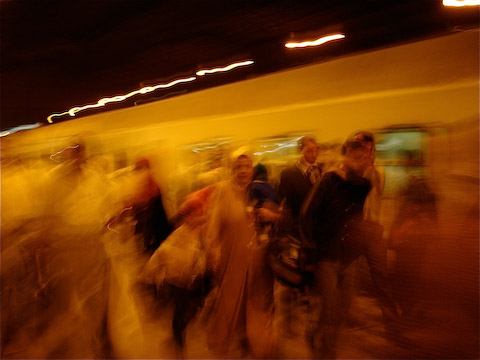 My roommate drank the water the night before and had just thrown up on my leg.
My roommate drank the water the night before and had just thrown up on my leg.
We were so weak from the heat that we hadn’t heard a word our guide said.
I could feel the fierce sun burning my skin.
I was in Egypt, and I was in a bad mood.
More specifically, I was outside Cairo at the temple of Queen Hatshepsut, a phenomenal ancient site. As our guide led us back towards the van we passed a line of stalls where merchants were selling their various wares; gorgeous Egyptian pieces hidden among the usual tourist bits and pieces.
Merchants here were, like all the Egyptians I had met, incredibly friendly, but they were often incredibly aggressive. At this particular moment, when I was one degree away from heatstroke, a man dressed in a long white tunic and a white head-covering approached me with his scarves, jabbering away.
 I barely even acknowledged him, glancing at his face only long enough to see that his chocolate-and-copper skin was like wrinkled silk, even though he was probably only about 40 years old. I shook my head and continued to walk.
I barely even acknowledged him, glancing at his face only long enough to see that his chocolate-and-copper skin was like wrinkled silk, even though he was probably only about 40 years old. I shook my head and continued to walk.
He followed me, still jabbering and holding out his scarves, like he was offering. I continued to shake my head, and he continued to follow me.
And then it happened: “Ay!” I shouted at him fiercely with a sharp “go away” wave of my left arm.
He shrank away at last, disappearing back into the stalls, and I immediately wished I could rewind.
Of all the missteps I have made when traveling, this was my Ugly American moment.
This man was poor. He wasn’t selling me the scarves; he was pleading. I did not recognize this at the time, but in my sepia-toned memory of this moment I can see it in his gesture, the tilt of his head, his focus on my eyes as I walked. Why didn’t I just give in and give him $5 for the scarf? Even as a 20-year-old student I was wealthier than this man would probably ever be.
So what happened to me in this moment? The intolerable heat had me immensely grumpy, but that did not justify my not being able to see that man for what he was: another human being doing what he needed to do in order to survive and provide for his family, in a country where the odds were stacked against him.
 One year later I was living on a Greek island and working in an art gallery. I struck up a conversation with an affable middle-aged American couple one day, and the wife began telling me about their travels in Turkey just before coming to Greece. She said she loved it, but she couldn’t stand how everyone in the bazaars was “so obnoxious and pushy” when they were trying to make a sale.
One year later I was living on a Greek island and working in an art gallery. I struck up a conversation with an affable middle-aged American couple one day, and the wife began telling me about their travels in Turkey just before coming to Greece. She said she loved it, but she couldn’t stand how everyone in the bazaars was “so obnoxious and pushy” when they were trying to make a sale.
I furrowed my brows. “Well, they’re poor and they need your money because you have dollars. That’s all.”
“Oh, is that what’s wrong with them?” she smiled with absolute innocence, but her friendly, open face now looked ignorant and oblivious.
After this comment I waited wordlessly in disbelief until they left the gallery, angry that someone—a traveler!—could have such little understanding about the world. At home that night I related the story to a local friend, expecting him to be as galled as I was, but he didn’t seem at all surprised. “We’re used to this,” he shrugged.
During the previous year I had regretted my own moment of ignorance with the Egyptian merchant, but never so much as I did after meeting this American woman. I hoped that I was not as Ugly as she was, but knew that I had fallen hideously short of my own expectations. I had demonstrated neither understanding, nor sensitivity, nor selflessness.
I have reflected on that fleeting interaction with the Egyptian merchant so many times, hoping that the next time I am in a similar situation, I will remember that man, those 20 seconds, and have the wisdom to pause and demonstrate compassion rather than frustration. After all, traveling isn’t just about seeing the world, it’s about seeing yourself in it.
What does the local person think when yet another American belittles their culture with a grunt or grimace of disgust? One minute we are smiling and well meaning with our big white teeth, and the next moment, with one wrong word, we are essentially stomping on their world with our big white sneakers.
What did we do? And do we know that we did it? Here are some tips on how to avoid the Ugly American stereotype:
- If you don’t have anything nice to say, at least try not to say it where people can hear you. Remember, in many countries, locals will speak at least some English. There will always be someone nearby who understands enough English to know when you are insulting their country. Americans are notorious for being oblivious, and it’s partly because we apparently equate speaking a different language with being deaf altogether. Like the proverbial tree in the forest, just because the locals have a different language does not mean they can’t hear your terrible crash. They hear you. Loud and clear. Which brings us to …
- Lower your voice. Just a little. Tourists are obvious enough (Clark Griswold, anyone?) and it’s generally not a good idea to draw any more attention to yourself. Take your cue from the locals—are they handling themselves quietly, like in Iceland? Or a bit louder and more boisterous, like in Italy?
- Realize there’s a 100 percent chance of having something in common with a person on the opposite of the world. All too often we focus on the different clothes, the unfamiliar smells, or the intimidating foods, and we forget that underneath those differences people are all the same. Everywhere. What do you have in common with the man who’s wearing a turban and eating with his hands? He is also probably concerned with feeding his family, keeping his children safe and happy, and having some laughs in between it all. You don’t have to look far to find a human connection, and finding it is often one of the most meaningful moments in travel.
- Read. Put in the effort to learn at least a little bit about the place you’re going to. Who is their current president, and what’s been going on lately? You don’t need to know a whole history, but knowing a bit about the culture and current events before you arrive will make it easier for you to understand and connect with the locals. People appreciate it when you’ve make the effort to learn about their country, and knowing something is, of course, the opposite of the Ugly American, who knows nothing. And if you aren’t particularly well-versed, people also appreciate it if you…
- At least show some interest. Ask questions with a gentle curiousness. People love to talk about where they come from, and a lack of knowledge will probably be overlooked if you show genuine interest. The likely scenario is they’ll be happy you asked, not offended that you didn’t know.
- Make the distinction between “weird” and “different.” It might not seem like a big deal to call something weird, but the subtle judgment is enough to distinguish between an Ugly American and a traveler with a higher level of understanding. We all know that we consider something “normal” when it’s familiar to us, but try not to call something weird just because it’s new to you. Your own culture may naturally be your frame of reference, and you don’t have to like whatever it is you’re seeing, but looking at it more objectively—as different—is a way to learn.
- Don’t assume that political strife means the people can’t get along. Our media casts many countries in a bad light, to say the least, and other media around the world do the same to the U.S. The result is that we confuse the people with their governments. The U.S. government isn’t too popular around the world, but Americans are generally well-liked, and it’s not as necessary as you think to be on the defensive. Similarly, just because the U.S. likes to point out which country isn’t our friend doesn’t mean the people can’t be friends.
- Greet people with a proper “Hello” and “How are you?” These pleasantries are highly valued in many cultures and it is considered rude to begin an interaction without a polite exchange. If in doubt, a polite greeting is probably appropriate.
- Don’t be afraid. In many cultures, it’s actually proper etiquette to invite people for a home-cooked meal. Go with your gut and common sense, of course, but if presented with an opportunity like this, take it. Spending some time with locals is the best way to get a better understanding of a culture beyond the tourist’s path. And chances are, the food isn’t going to kill you. So if your host offers you something unrecognizable, say thank you and help yourself to a bite.
- Above all, have some humility. The American who barges into a country expecting everything to be for his or her entertainment is the bull in a china shop and the general image of the Ugly American. Approach a local with humility when you’re, say, asking for directions or ordering food. Realize that you’re reliant on their kindness. People are quicker to be friendly and helpful when they see you have enough respect to not demand everything be for your convenience.
Yes, we are well-meaning. But there’s always room for curbing the human instinct to criticize that which is different. Suspend your mental comparisons and show your good intentions instead – often time, that’s all it takes to make the connections that make traveling worthwhile.
Text and Photos by Sumayya Essack for PeterGreenberg.com. View her travel photography at www.sumayyamaria.com. She has also written several guides for PeterGreenberg.com:
- Off the Brochure Travel Guide: Miami, Florida
- Off the Brochure Travel Guide: Buenos Aires, Argentina
- Off the Brochure Travel Guide: Reykjavik, Iceland
For more help on being a responsible traveler, check out:












